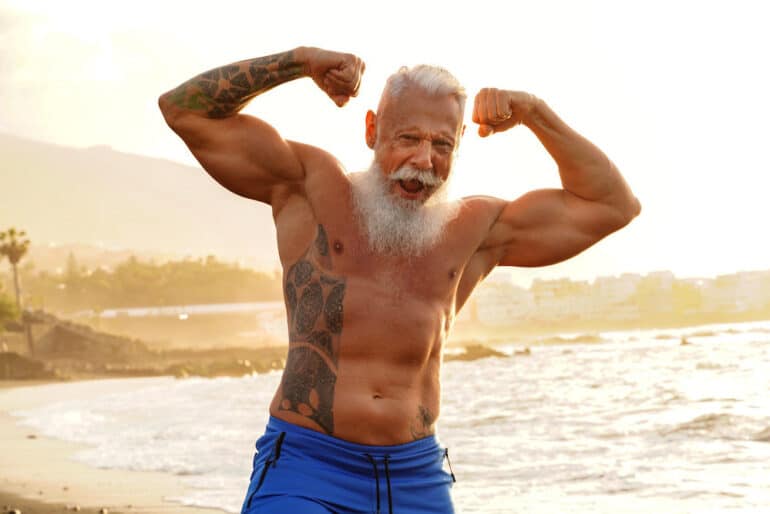Metabolic Age: What It Is and How It Can Help Slow Aging
Understanding your metabolic age and how it relates to your body's overall health can be a great indicator of how your body ages and what you can do to help yourself get healthier. Metabolic age changes with your age and doesn't have an impacting factor on your aging. Instead, how you care for your body and physical health can affect how you age, acting your metabolic age. It might sound complicated and confusing, but rest assured that once you have a solid understanding of what the phrase 'metabolic age' means, you'll be able to understand your body's overall health better. Then you'll be able to take better care of yourself. It can also help slow some signs of aging both physically through appearance and internally by preventing health issues that appear with age, such as cancer, Alzheimer's, heart disease, or even diabetes.
Metabolic Age Rundown
It might be challenging to understand metabolic age, but you can better understand it by breaking it down into multiple steps. If you find you're lost and don't understand what the heck is going on, you can refer to the last stage of the explanation.
- 1st Step in Understanding Metabolic Age: Understanding Basal Metabolic Rate (BMR)
- 2nd Step In Understanding Metabololic Age: How to Calculate Your Basal Metabolic Rate
- 3rd Step In Understanding Metabolic Age: Using Your Basal Metabolic Rate To Understand Your Calorie Intake
- 4th Step in Understanding Metabolic Age: Using Your BMR to Decipher Your Metabolic Age
- How To Understand Your Metabolic Age
- How Does Aging Change Your Metabolic Age
- Different Ways You Can Try to Change Your Metabolic Age
- How to Get the Most out of Understanding Metabolic Age and Its Relation to Aging
1st Step in Understanding Metabolic Age: Understanding Basal Metabolic Rate (BMR)
It's all fun and games learning about bettering your health until you try to learn something and realize you need a biology degree to understand half the words medical professionals and health experts throw at you with ease. Allow this article to break down these phrases and precisely what they mean in very basic terms.
Also, please be patient in understanding that the best way to communicate complicated terms such as basal metabolic rate often is to offer multiple explanations of the same definition. These variations can also help clear any minor confusion that might appear as you read on.
Basal Metabolic Rate (BMR) refers to the minimum number of calories your body needs to function at a basic level. Basic bodily functions include breathing, blood circulation, cell production, nutrient processing, and other fun things your body does for you without lifting a finger. Any basic life-sustaining function that your body completes regularly and continuously uses a lot of your daily calories. About 60 to 75% of your daily calorie intake is explicitly devoted to supporting these life-sustaining functions.
It's effortless to let your body process nutrients from your food and circulate them through your blood. Most people do not have to do anything, and their bodies will perform these tasks just fine. However, suppose you have some rare health conditions that affect your body's ability to function at a basic level. In that case, it will make figuring out your BMR much more difficult, so for simplicity, this article will assume you do not have any ongoing health issues that affect these things.
One of the essential parts of your BMR is that it specifically does not include any physical activity you might partake in because this is supposed to measure your basic metabolic rate. However, there are a lot of factors that can affect your BMR, such as sex, weight, height, age, ethnicity, weight history, genetics, and bodily composition.
It's helpful to know your BMR because it can indicate whether you need to gain, lose, or maintain your weight. But you should keep in mind that while BMR can help provide insight into your body's overall health, this is just one measurement of your body. Information such as your BMR can be insightful into your overall health. Still, it is not gospel on your health, and you should always check in with a medical professional or dietician if you're looking to get a more accurate understanding of your health.
2nd Step In Understanding Metabololic Age: How to Calculate Your Basal Metabolic Rate
Some websites will provide you with a very long and complex equation that you can plug all of your information into and receive a BMR number in addition to your minimum daily calories needed. You can certainly search for an equation, but this article will offer you two calculators that perform the math for you.
These websites use the same Harris-Benedict Equation, but they have somewhat different inputs and might give you a metabolic rate that varies the littlest bit. Cornell uses this equation, as does this manytools.com calculator.
Remember that BMR can offer a lot of insight, but this is by no means a defining factor of your overall health. Most people use this information to help them figure out if they should be eating more calories, less, or maintaining the same calorie intake for their health goals.
3rd Step In Understanding Metabolic Age: Using Your Basal Metabolic Rate To Understand Your Calorie Intake
If you take advantage of these online calculators that do all the complex math, you'll get two numbers gifted to you. The number that comes after the letters BMR is your 'Basic Metabolic Rate.'
Sometimes these calculators like to take a simple thing and make it complicated, so some abbreviations for BMR will read as the acronym BEE. BEE stands for 'Basic Energy Expenditure,' which is another way of saying BMR.
It's also worth mentioning the BEE is only interchangeable with BMR if it has the word 'basal' at the beginning. Some information will provide you with just your 'energy expenditure,' which is a combination of your basic energy needs and your activity increments.
The second number that most BMR calculators will output is your 'Daily Calorie Needs,' which is a number that includes your basic metabolic needs in conjecture with your activity increments.
If your think that 'Daily Calorie Needs' and 'Energy Expenditure' sound like the same thing, you'd be right!
You might come across other acronyms like RMR or REE if you go on other websites. RMR stands for 'Resting Metabolic Rate,' and this phrase represents the calories your body uses while it's at rest. REE is another fun way the medical field complicates things as this acronym means 'Resting Energy Expenditure,' which is directly interchangeable with RMR. It implies that REE and RMR mean the same thing, and they're just two different ways of describing your body's calories needs while it's at rest.
Some sources will use RMR interchangeably with BMR to make matters more confusing. If you need a reminder, so you don't mix up all of these acronyms, BMR stands for 'Basic Metabolic Rate,' and RMR is "Resting Metabolic Rate' the distinct difference between these two acronyms is apparent in the first word of each acronym.
'Basal' means the minimum calorie intake your body requires to perform essential life functions. However, 'resting' includes other normal tasks you partake in your daily life, such as using the bathroom, sweating, shivering, or consuming caffeine.
RMR and BMR are interchangeable because the difference between your body's basic and resting needs is often negligible when determining if you need to consume more, less, or consistent amounts of calorie intake.
You deserve an A+ for understanding something these health websites make extra complicated. Even if you're not quite sure you know this quite yet, you still deserve an A+ for wanting to get informed about bettering your health.
After you've got these numbers, you have to know what to do with them for this information to be helpful.
4th Step in Understanding Metabolic Age: Using Your BMR to Decipher Your Metabolic Age
You may have forgotten that this article started with the goal of teaching you how to understand your 'Metabolic Age,' and you might be wondering why it spent so long explaining BMR instead of Metabolic Age. It's simple. Figuring out your 'Metabolic Age' entirely depends on first understanding your BMR and then using that number and comparing it to other people in the same chronological age range as you.
Before you compare your BMR to other people your age, you must remember that many medical health professionals have complaints about BMR just as they do about BMI. These numbers can offer insight into your overall health, but you should take this information with a grain of salt. Don't rely too heavily on this to predict whether you will develop other aging-related health issues. Instead, use this as a beginning look at your dietary needs and decipher if you need to make any changes to meet your 'Metabolic Age' goals.
How To Understand Your Metabolic Age
'Metabolic Age' looks at how your body burns calories at rest compared to people in the same general age range as you within the general population. See how we mention the word 'general' twice? It's no typo. This measurement does not offer specific insights into your physical health.
This single measurement does not accurately understand how your body ages or how your metabolism has slowed. You can use this in conjunction with other helpful information such as BMIs. If your 'Metabolic Age' is your age or younger, you have pretty good overall health. Usually, if your 'Metabolic Age' is older than your actual age, it might point to poor overall health or other health issues.
It might be hard for you to find information about the average population 'Metabolic Age' numbers. While knowing your BMR is a good indicator of your 'Metabolic Age,' figuring out your actual number is complex.
According to Healthline, "If you're interested in determining your metabolic age, talk to your doctor, dietitian, personal trainer, or other fitness experts."
Unless you have a doctor on call, it might take you a few days before you understand your 'Metabolic Age,' but in the meantime, you can learn about how aging affects this number, and the different ways to can alter it.
How Does Aging Change Your Metabolic Age
Our BMRs are typically highest when we're young, as we're growing and developing, but then it drops in your mid to late 20s and continues to fall after that. It's very natural for your metabolism to slow as you age, and there are a handful of reasons this can occur.
One main factor in this slowing metabolism is that people tend to exercise less as they age, leading to a loss of muscle mass. Having deficiencies in both areas allows your metabolism to slow faster and naturally makes your body useless calories.
Different Ways You Can Try to Change Your Metabolic Age
There are plenty of ways you can try to kick start your metabolism, and this better your 'Metabolic Age' as a result. A few easy ways to improve your metabolic age is by eating healthier foods. Eating plenty of fruits and vegetables is genuinely very important to your lifelong health. Doing so can prolong factors that make your body age faster, such as a slower metabolism. You can slow aging factors by choosing whole carbs over refined carbs and picking from leaner forms of protein like salmon.
While it is good for you to change your food habits, many Americans cannot practically afford to change them, as healthier meals often cost more money. Another way you can change your diet but save some money is to refrain from eating out. This way, you don't spend excessive money on foods that are usually extra high in sodium and butter contents. One fantastic way to help your diet and metabolism is to cut sugary drinks out of your diet. Water is considerably cheaper than sodas, juices, or other tasty drinks. Even though those luxuries are enjoyable now and then, cutting them out of your regular diet is an excellent way to ensure your health.
You can also cut down on portion sizes and work alongside a nutritionist or dietician to decipher what the best foods for you would be. When people say 'you are what you eat,' it's no exaggeration. If you eat plenty of harmful chemicals, you're more likely to hurt your health and cause stomach aches. In contrast, if you eat plenty of vitamin-rich foods with healthy fatty acids, you'll reap those benefits, so choose what you put into your body.
Another semi-obvious way to increase your metabolism is to increase your physical activity. In the previous subsection, you can read about how a lot of the time, metabolism slows with age simply because exercise and muscle mass decreases with age too. If you create a regular workout routine, you can develop many benefits, including increasing your muscle mass, burning more calories, and helping your metabolism stay young and strong.
As important as diet and exercise are, people commonly overlook that taking care of your body includes getting plenty of rest. It can be hard to remember that sometimes the best thing you can do for your health is do nothing and take a nap. Getting a regular amount of sleep helps your body function better and helps your metabolism stay strong. Also, sleep reduces stress and stress links to poor food habits and slow metabolisms.
How to Get the Most out of Understanding Metabolic Age and Its Relation to Aging
A critical factor in understanding 'Metabolic Age' is to understand what your metabolism is and what your BMR is. As mentioned at the beginning of this article, BMR shifts focus from weight and instead focuses on your body's structure, composition, muscle, and fat. 'Metabolic Age' is also very complicated to decipher. The closest you can get to figure it out on your own is using one of the calculators linked in this article to discover your BMR.
Even though there are equations and calculators, the best and most accurate way to get your 'Metabolic Age' is by going to a doctor and working with them to discover your metabolism compared to other people in the same general age range.
Understand that 'Metabolic Age' cannot slow your aging but is a complete insight into how you are aging. You can help yourself fight aging symptoms by eating healthily, exercising, getting plenty of sleep, and taking proper care of your body. All of these things will also help speed up your metabolism. Your takeaway from this article should be that if you work to develop an idea of 'Metabolic Age' for yourself, you will simultaneously be assisting yourself in fighting the biological aging process humans go through. Physical activity like aerobic exercise and strength training combined with healthy eating and calorie restriction can work wonders for your body composition and have plenty of positive impacts on your overall health, including helping to slow some symptoms of aging.









